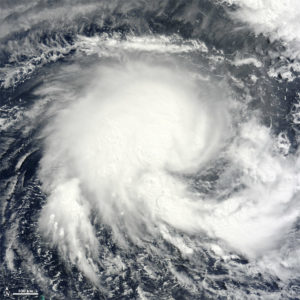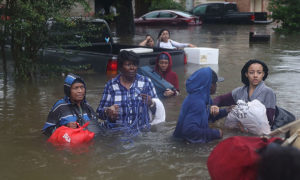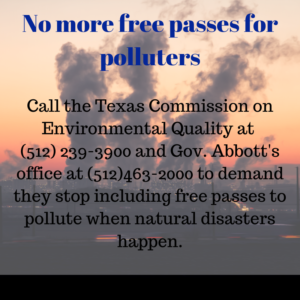Disaster Declarations and Environmental Rule Suspensions in Texas
What do they mean, and what can I do?
By Adrian Shelley

Tropical Storm Imelda made landfall on the Texas Gulf Coast Thursday, Sept. 19. It was the third “100-year storm” in the region since 2016.
Texas Governor Greg Abbott responded with a disaster declaration for 13 counties, citing “widespread and severe property damage, and threaten[ed] loss of life.” Along with the disaster declaration came a request from the Texas Commission on Environmental Quality (TCEQ) to suspend environmental rules, followed by an additional request — much broader than the first — to suspend more rules. These requests were immediately approved by the governor, meaning that the Texas Gulf Coast is again operating without environmental safeguards.
Again? After Hurricane Harvey, Governor Abbott issued a disaster declaration (still in effect) and a rule suspension. The Harvey rule suspension ended only after environmentalists called for it to be lifted nearly seven months after the devastating storm. We don’t know why that rule suspension lasted for seven months, but we vowed not to let another environmental rule suspension go unnoticed by Texans impacted by natural disasters.

Which brings us to today. The Friday after Imelda, Public Citizen issued a statement opposing the rule suspension and sent a letter to Gov. Abbott requesting that it be rescinded. The governor may find it necessary to continue the Imelda disaster declaration for several months–that is his decision–but we will oppose any attempt to continue the rule suspension.
As we have spoken to people affected by Tropical Storm Imelda, we’ve heard questions about the environmental rule suspension. So we’d like to address some of those questions now. Hopefully, you will agree that it isn’t necessary to suspend environmental rules established to protect public health, and join us in calling for them to be reinstated.
Does the Governor have the authority to suspend rules?
Yes. Authority for a rule suspension comes from Texas Government Code § 418.016, which states in paragraph (a) that:
The governor may suspend the provisions of any regulatory statute prescribing the procedures for conduct of state business or the orders or rules of a state agency if strict compliance with the provisions, orders, or rules would in any way prevent, hinder, or delay necessary action in coping with a disaster.
Did all of the rules that were suspended need to be suspended?
No. Some rule suspensions might be appropriate–such as those related to debris management–but many of them were unnecessary or actually fall outside of the Governor’s authority. Notice that the above statute applies only to rules for which “strict compliance” would “prevent, hinder, or delay necessary action.” Many of the rules that were suspended–such as record keeping requirements, requirements for a federal operating permit, or permit fees for new permit applications–bear little or no relationship to disaster recovery.
Do you believe any rules should have been suspended?
No. The TCEQ has discretion to only punish rule violations that it chooses to punish. This is called “enforcement discretion” and TCEQ already uses it liberally. In fact the TCEQ penalizes fewer than 3% of self-reported air pollution violations. We recommend that, rather than suspending hundreds of environmental rules, the TCEQ issue guidance to companies that they will not be penalized if they can demonstrate that any rule violation was caused by a disaster or disaster response.
Does that mean you are in favor of a “free pass” for polluters during disasters?
No. Some pollution events are the result of foreseeable occurrences, such as excessive amounts of wastewater or failures of above ground petroleum storage tanks with floating roofs. If a company pollutes because it is careless, negligent, or not accounting for foreseeable risks–even during a disaster–it deserves to pay a penalty.
I witnessed polluted water/air/land during a disaster. What should I do?
If you witness pollution, you should file a complaint. You can file a complaint with the TCEQ via phone or email. You can do the same with Harris County or the City of Houston, depending on where you live. It’s not necessary for you to know whether a law or rule is being broken–that’s for the regulators to decide. If you see something that concerns you, you should file a complaint.
If the pollution has an impact on your health or safety, it is especially important for you to file a complaint and seek medical treatment if necessary.
It’s also important to keep a record of your complaint so that you can follow up. It can be helpful to enlist an advocacy organization (such as Public Citizen) to help you file and track the progress of a complaint.
What can I do to help?
The decision to suspend environmental rules comes from two people: Governor Greg Abbott and TCEQ Executive Director Toby Baker. The rule suspension must be renewed every 30 days to stay in effect. That renewal happens at the same time as the disaster declaration is extended. We have already requested that the rule suspension be ended, and we will do so each month before the disaster declaration is renewed (we don’t oppose the disaster declaration, just the rule suspensions).
If you would like to let the Governor and the TCEQ know that you oppose suspension of environmental rules, we recommend you call their offices:
Office of Governor Greg Abbott
512-463-2000
Ask for Jordan Rodriguez, Policy Advisory, or another staff member.
TCEQ Executive Director Toby Baker
512-239-3900
Ask for Director Baker or his staff.